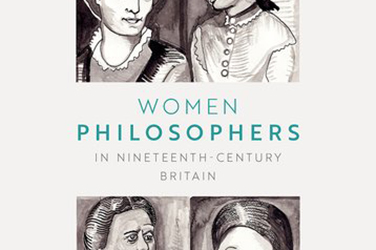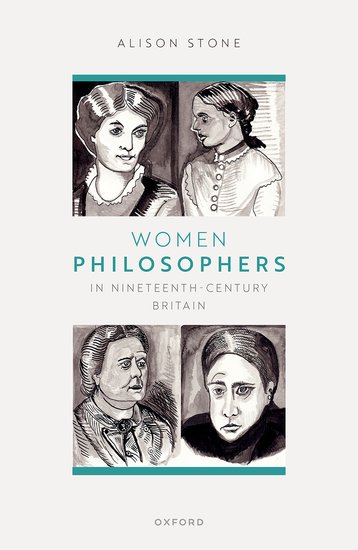
- Free Article: No
- Contents Category: Philosophy
- Review Article: Yes
- Article Title: Disappearing ink
- Article Subtitle: Absentees in the history of philosophy
- Online Only: No
- Custom Highlight Text:
Ask anybody to name a philosopher and, chances are, if they can name one, it will be a man. Ask them to name a nineteenth-century British philosopher and they may be stumped, but if they can name one, it will be a man. This book on nineteenth-century women philosophers thus delves into the intersection of two areas of general ignorance.
- Featured Image (400px * 250px):

- Alt Tag (Featured Image): Karen Green reviews 'Women Philosophers in Nineteenth-Century Britain' by Alison Stone
- Book 1 Title: Women Philosophers in Nineteenth-Century Britain
- Book 1 Biblio: Oxford University Press, £72 hb, 290 pp
- Book 1 Cover Small (400 x 600):

- Book 1 Cover (800 x 1200):

Stone does not mention it, but turning away from the works of the great, dead, white men and reading those of their, admittedly, dead, white, female contemporaries arguably offers more accurate insights into the actual philosophical concerns of past times than does a concentration on the established greats. Women tend to have entered philosophy as educators, disseminators, critics, and popularisers of philosophical ideas. Reading what they wrote provides fresh and sometimes surprising perspectives on past intellectual landscapes. The history of philosophy, as taught, is dominated by endless commentary on a few ‘greats’, who have become ‘great’ by being constantly read, interpreted, translated, excerpted, and critiqued. The history of philosophy as lived was a dynamic conversation among many forgotten voices, some of whom were more dominant in their time than those now canonised.
Many of the women whose ideas Stone discusses – Harriet Martineau, George Eliot, Frances Power Cobbe, Helena Petrovna Blavatsky, Victoria Welby, and Annie Besant – were famous in their day, and their names still possess a certain recognition factor, though, apart from Eliot – famous as a novelist – their works are little studied. Others – Mary Shepherd, Julia Wedgwood, Arabella Buckley, Vernon Lee, and Constance Naden – have descended into complete obscurity, while one, Ada Lovelace, may be more famous now than she was during her lifetime, having been credited with writing the first computer program, and having acquired fame as an early participant in the history of computer science.
Stone has decided not to look at the social and political philosophies of these women, but to discuss their views on ethics, religion, metaphysics, and epistemology. I think this is a pity, since some, particularly Martineau, were more influential as social and political thinkers than as metaphysicians or epistemologists. But she rightly judges that it is as contributors to these mainstream areas that women’s works have been particularly neglected. Women have been included in histories of feminism, but not considered as contributors to the philosophy of science, philosophy of mind, philosophy of religion, philosophy of history, or meta-ethics.
The chapters are loosely organised around these topics. In each, a confrontation or conversation is set up between the conflicting views of some of the women discussed. Thus, chapter two, ‘Naturalism’, opposes Martineau’s fully naturalist and empiricist ethics and philosophy of science to Shepherd’s more rationalist or Kantian view, according to which scientific knowledge is impossible without some innate organising categories, provided by reason. The chapter then turns to the related issue in moral epistemology, contrasting Martineau’s naturalism with Cobbe’s intuitionism and Kantian claim that the ‘universality and necessity of basic moral principles’ cannot be derived from experience alone.
Classic problems in the philosophy of mind – whether machines can think, whether minds are brains, the explanatory gap dividing accounts of causally determined matter, and our subjective experience and free will – are discussed in the third chapter. Not surprisingly, Lovelace considered the possibility that a computing machine can think, but hesitated over the answer, ultimately deciding in the negative, because a machine lacks imagination and the capacity to ‘anticipate’. Others – Cobbe, Naden, Besant, and Blavatsky – each developed original views. Cobbe argued that while the brain is capable of unconscious thought, we are, for that reason, not identical with our brains since we do not always identify with the productions of our unconscious brain activity. Naden developed a monistic idealism, identifying reality with the subjective productions of our brains, while Besant and Blavatsky became pantheistic monists, hoping to overcome the explanatory gap that faces materialists and dualists alike.
The publication of Darwin’s Origin of the Species and Descent of Man provoked intense debate over the compatibility of the theory of evolution with both Christianity and moral knowledge. In one of her most interesting chapters, Stone shows how women who were often associated with Darwin’s circle – Wedgwood, Cobbe, Buckley, and Besant – struggled with the question of whether natural selection and Darwin’s account of the evolution of altruistic, moral motivation are compatible with religious belief and moral objectivity. The related more general question of the relationship between morality and religion was, as Stone comments, ‘a pivotal issue for many nineteenth-century women’. In the fifth chapter Martineau, Eliot, Lee, and Besant’s various attempts to explain how a secularist ethic can survive loss of faith in Christianity are pitted against Cobbe’s insistence that, without belief in God, morality collapses. These women accept the moral injunctions of Christianity, believing them to be the result of progress towards moral truth, but differ over the need to anchor this morality in religious faith.
The last chapter turns to the contrasting grand narratives of the religious and moral progress of humanity crafted by Martineau, Cobbe, Wedgwood, and Blavatsky. Though divided over whether that progress was secular, Christian, or, in Blavatsky’s case, a theosophical restoration of ancient wisdom, all believed in moral progress, an optimism sadly contradicted by twentieth-century events. Stone’s work contributes to a different grand narrative, one recognising women’s place in the development of the philosophical ideas that have shaped us.


Comments powered by CComment